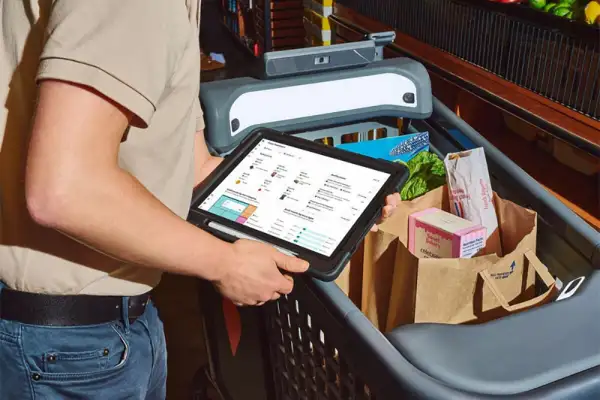AI-Powered Smart Carts: A Secret Weapon for Grocery Savings?

The next time you go grocery shopping, bring along AI. If used carefully, it could help you save money.
In recent months, retailers like Wegmans, Schnucks, ShopRite and Kroger have begun testing out "smart" carts in stores alongside traditional analog ones. There are several different brands, including Shopic and Amazon's Dash Cart, but perhaps the most popular is the Instacart-owned Caper Cart, which is available in more than 60 U.S. cities, per a spokesperson.
Regardless of manufacturer, these smart grocery carts have the potential to totally change the way you shop. Smart carts are able to sense, scan and weigh items as you put them in the cart, displaying a running total on a small screen. Some also provide maps of the store, digital coupons and the ability to pay using the cart itself as a point of service terminal.
"I think [smart carts] are going to have a really positive impact on shopper experience," says Jie Zhang, dean's professor of marketing at the University of Maryland.
The biggest perk here is the ability to make more informed purchase decisions. For example, if you've set aside $100 for a specific shopping trip and you can see you've reached $80 halfway through, you can remove nonessential items and/or substitute them with cheaper options right then and there. Without a smart cart, you would have an awkward moment at the checkout counter.
Zhang anticipates this shift in consumer behavior because it occurs in related scenarios. Her research has shown that when shopping online, shoppers commonly make substitutions, modifications or eliminations when they see their virtual cart's total. So it's reasonable to expect a similar phenomenon with the smart carts.
"Our data shows 83% of customers are eager to use smart carts specifically for savings and budgeting," David McIntosh, chief connected stores officer at Instacart, tells Money. "When customers can track their spending and watch their running total in real time, they're not only able to stick to their budgets more effectively but also maximize their dollars."
Geoff Tomaino, an assistant professor at the University of Florida who studies consumer judgment and decision-making, says smart carts greatly reduce friction, or tiny barriers that make doing something difficult.
For example, with an old-school shopping cart, if you want to buy a pound of, say, potatoes, you have to hunt down the scale, weigh the potatoes, bag them and put them in your cart. That's all friction. But with a smart cart, you can just toss the potatoes in. That friction is reduced — and the entire shopping experience is easier.
That ease may make the difference between you purchasing potatoes and you deciding the hassle is not worth it. (It also means smart carts may actually encourage people to eat more produce, Tomaino says.)
At the same time, smart carts may impact the pain of paying, which refers to the negative emotions that arise when paying for a good or service, and salience, which is the quality of something being particularly noticeable. When using a smart cart, you're seeing your total go up bit by bit and being constantly shown how much money you're paying versus only thinking about it once, Tomaino says. As a result, you might spend less.
The downsides of smart shopping carts
That's not to suggest smart carts don't have downsides. They do — and a major one is that they could sneakily lead you to spend more.
Imagine that you've decided to spend $100 on a shopping trip. Normally, if you go through checkout and discover you only spent $80, you would probably just fist-bump the cashier and go on your way.
But if your smart cart is telling you you're at $80 and you're still standing in the aisles, you're likely to fill that gap with frivolous items like candy or wine, Tomaino says. That's not ideal for your budget.
Speaking generally, a lot of these pros and cons depend on how, exactly, the smart carts are implemented. "On one hand, smart shopping carts [can] help consumers be more disciplined within their budget. On the other hand, technology could actually increase sales through making personalized product recommendations in real time," Zhang says.
Put bluntly, if retailers use the smart carts to suggest useful coupons, that's great. But if retailers abuse this tool and become too pushy, it could seriously backfire.
"If consumers are inundated with product pitches they don't care about or don't want, that could be a real annoyance that could really ruin the potential of this technology," she adds.
More from Money:
Why Are Store Return Policies Suddenly Getting Worse?
